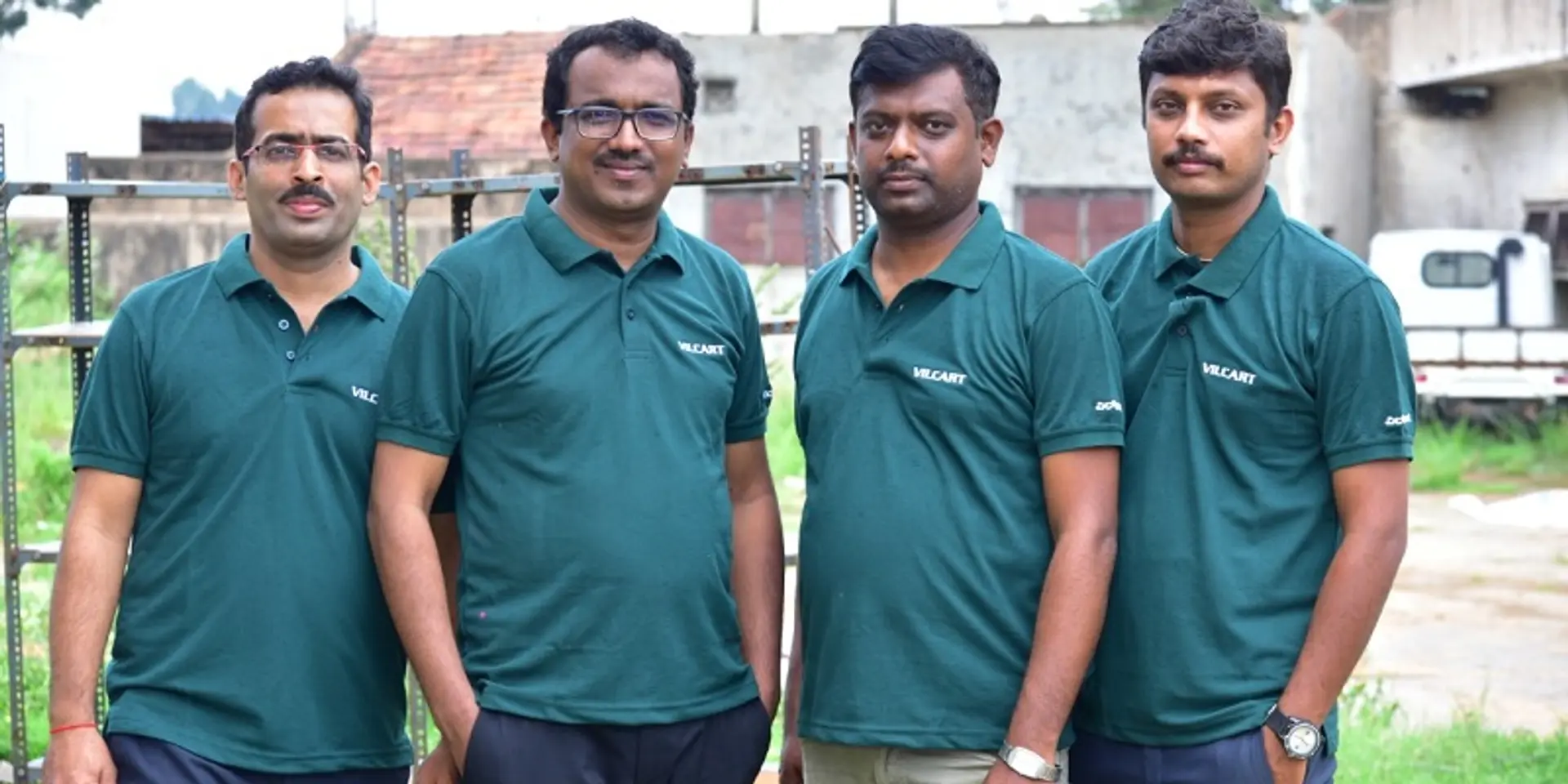This ecommerce startup is transforming retail experience for rural kiranas
Founded by four rural entrepreneurs, Bengaluru-based VilCart is providing technology, marketing, and logistics support to rural kiranas.
The retail sector is highly unorganised in rural India. Unlike metros, shop owners in rural areas have to travel long distances to procure supplies. They also find it difficult to increase their margins, and sometimes miss out on which SKU to stock up as they are not aware of their customers needs.
After gaining insight into the problem, Prasanna Kumar, Mahesh Bhat, Rajasekhar, and Amith S Mali started in 2018.
It is a B2B ecommerce company, which aims to revolutionise the retail industry in rural India through technology, supply chain, and logistics facilities.
The startup started business from one district, and has now rapidly expanded to three districts in Karnataka, including Mandya, Kolar, and Bengaluru rural. Currently, the startup is catering to the needs of over 5,000 kirana stores across 1,000+ villages.

VilCart founders
How it all started?
Prasanna Kumar comes from a rural agricultural background in Karnataka. Between 2003 and 2005, when he was doing his graduation, he got an insight into the complex grocery supply chain during his daily commute. Prasanna decided to find a solution to the problems faced by kirana owners and give them an urban feel in terms of running their business.
Between 2013 and 2017, Prasanna travelled across Karnataka, Andhra Pradesh, and Tamil Nadu, and interacted with kirana owners and identified the problems faced by them and the consumers.
“It gave me a great insight into the rural consumer issues. Though their earnings were low and dependent on agriculture, they were paying more for the same products as compared to urban consumers. This was mainly because of long supply chains and multiple intermediaries,” says Prasanna, who is a chartered accountant.
Prasanna was joined by his friend Amith S Mali, an engineer by profession. Amith also comes from a rural business family dealing with agri products, and he was excited to join hands with Prasanna when the idea was discussed with him. Prasanna’s friend Mahesh Bhat, also a CA, joined the startup. He worked at companies like Infosys and IBM before joining the startup. They roped in Rajashekar, who understood food safety and quality. He had worked in companies like Bigbasket and Metro Cash & Carry, and joined VilCart in 2018.
The solution
Rural kirana shop owners are forced to shut shop three to four days in a month in order to procure materials from a nearby town. They purchase from 8-10 vendors and arrange their own logistics to carry the products to their villages, and sometimes even carry it on their two wheelers to cut costs.
“Since they need to shut their shops for procurement, they tend to invest more on inventory. They also do not have access to newly-launched products in the market. Rural consumers also do not have the choice like urban customers, and they have to buy what is available in the kirana stores,” says Prasanna.
The logistics cost is the reason the product cost goes up to the end customer in rural areas., and VilCart hopes to solve this problem with technology.
As there is no vernacular mobile app to manage the inventory and end customers’ credit, VilCart has come up with a mobile app to help kiranas to manage these issues.
Shop owners can also bill using an in-built barcode scanner and can also manage credit given to their customers on a real time basis using the app. They can also access information about new products/offers/promos on the products available, which would help them to take better decisions without much of an investment. Since all this can be done on a smartphone, they need not invest on software or hardware for the same.
Digitising the kiranas was the next pain point addressed by VilCrt. The startup also provides door-step delivery twice a week directly from manufacturers or primary markets to the kiranas. This makes VilCart a “one stop solution” for all rural Kirana store needs.
This, in turn, helps the kirana store owner to invest less on inventory, and use the same money for product diversification, thereby increasing visibility in the eyes of the end customer. This also helps the kirana owner to earn more. The next pain point addressed was the issue of working capital.
“As a technology-led ecommerce company which digitises the entire supply chain, we believe we deliver the most value to the end customer,” says Prasanna.
The business
According to KPMG, there are around 12 million kirana stores in the country, and the rural e-tail market presents a $10 billion to $12 billion opportunity for ecommerce firms in the next four years.
“We are an exclusive rural ecommerce company where our reach is below taluka and to villages, which have only 250 people and one kirana store. Most of the companies are attending to the needs of urban markets and that’s where it makes sense to serve smaller towns and villages too,” says Prasanna.
VilCart works on an inventory-based business model and charges a margin on sales. The promoters invested Rs 60 lakh initially, and again invested Rs 40 lakh last year.
The startup raised around Rs 2 crore investment from Prashanth Prakash of Accel Partners; Jyothirmayee, CEO of Hiveminds; Anand Banka, Head of Investments at Vedanta and Ex-director of EY; Kalit Kapur, AGM of Vendanta; and Girish, Founder of Qspiders & Testyantra, and few others. The startup, which competes with Jumbotail and Mobisy, has reported aGMV of Rs 48 crore per year.
The challenges
VilCart also believes in the “Hire locally Grow Globally” concept. “We hire local youth and women for our operations, and a majority of them are first time employees. Keeping them motivated and training them takes a lot of time and effort,” says Prasanna.
The founders add that one factor that no one understands, unless they closely work with the rural economy, is that the locals work emotionally rather than rationally.
“Even a small change in the way we work can create a big impact on how we do business with them. This is where the people we employ makes a difference. They understand the mindset of the business owners and help us grow our business," say the founders.
Some of the other challenges include organising and optimising rural supply chain management. Maintaining the harmony between suppliers, kirana stores, rural consumers, and the rural retail ecosystem is also a major challenge.
Plans ahead
In the next 18 months, the startup aims to cover most rural areas of Karnataka, and wants to cover two districts each in Andhra Pradesh, Telangana, and Tamil Nadu.
It also wants to start a “Farmer to Farmer” business, and wants to buy from farmers at one geography and sell it at another geography.
For the moment, VilCart’s objective is to cater to the needs of all the rural kirana stores, irrespective of their order value.
Edited by Megha Reddy









